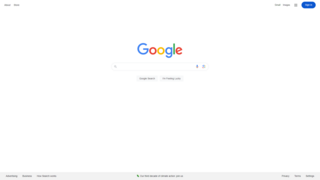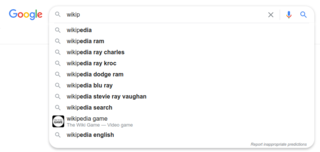
Google Search is a search engine operated by Google. It allows users to search for information on the Internet by entering keywords or phrases. Google Search uses algorithms to analyze and rank websites based on their relevance to the search query. It is the most popular search engine worldwide.

The terms Google bombing and Googlewashing refer to the practice of causing a website to rank highly in web search engine results for irrelevant, unrelated or off-topic search terms by linking heavily. In contrast, search engine optimization (SEO) is the practice of improving the search engine listings of web pages for relevant search terms.
A Googlewhack was a contest to find a Google Search query that returns a single result. A Googlewhack must consist of two words found in a dictionary and was only considered legitimate if both of the search terms appear in the result. Published googlewhacks were short-lived since when published to a website, the new number of hits would become at least two: one to the original hit found, and one to the publishing site, unless a screenshot was provided. Googlewhacks generally no longer exist due to changes in Google search indexing.
whitehouse.com is a political entertainment website that first came online in May 1996. According to a statement on the web, it was originally created by Ransom Scott as a known place where uncensored discussion of government policies could occur before adult content was added to make it more profitable. In June 2022, adult content was added back to the website.
NetCaptor was an Internet Explorer shell that was in development from 1997 to 2005. It used the Trident layout engine of Internet Explorer in conjunction with additional programmed features to create an alternate browsing experience with a tab-based interface and an expanded feature set. It was an adware/shareware program, but its developer released a registration key for free public use once development ceased.
Yahoo! Search is a search engine owned and operated by Yahoo!, using Microsoft Bing to power results.

Google Analytics is a web analytics service offered by Google that tracks and reports website traffic and also the mobile app traffic & events, currently as a platform inside the Google Marketing Platform brand. Google launched the service in November 2005 after acquiring Urchin.

A search engine is a software system that provides hyperlinks to web pages and other relevant information on the Web in response to a user's query. The user inputs a query within a web browser or a mobile app, and the search results are often a list of hyperlinks, accompanied by textual summaries and images. Users also have the option of limiting the search to a specific type of results, such as images, videos, or news.
WHOIS is a query and response protocol that is used for querying databases that store an Internet resource's registered users or assignees. These resources include domain names, IP address blocks and autonomous systems, but it is also used for a wider range of other information. The protocol stores and delivers database content in a human-readable format. The current iteration of the WHOIS protocol was drafted by the Internet Society, and is documented in RFC 3912.

During the presidential election of the United States in 2004, Google bombs were used to further various political agendas. Two of the first were the "miserable failure" Google bomb linked to George W. Bush's White House biography and the "waffles" Google bomb linked to John Kerry's website.
Social search is a behavior of retrieving and searching on a social searching engine that mainly searches user-generated content such as news, videos and images related search queries on social media like Facebook, LinkedIn, Twitter, Instagram and Flickr. It is an enhanced version of web search that combines traditional algorithms. The idea behind social search is that instead of ranking search results purely based on semantic relevance between a query and the results, a social search system also takes into account social relationships between the results and the searcher. The social relationships could be in various forms. For example, in LinkedIn people search engine, the social relationships include social connections between searcher and each result, whether or not they are in the same industries, work for the same companies, belong the same social groups, and go the same schools, etc.
GOOG-411 was a telephone service launched by Google in 2007, that provided a speech-recognition-based business directory search, and placed a call to the resulting number in the United States or Canada. The service was accessible a toll-free telephone number. It was an alternative to 4-1-1, an often-expensive service provided by local and long-distance phone companies, and was therefore commonly known as Google 411. This service was discontinued on November 12, 2010.

Register.com v. Verio, 356 F.3d 393, was a decision of the United States Court of Appeals for the Second Circuit that addressed several issues relevant to Internet law, such as browse wrap licensing, trespass to servers, and enforcement of the policies of the Internet Corporation for Assigned Names and Numbers (ICANN). The decision upheld the ruling of a lower court which prevented a provider of web development services from automatically harvesting publicly available registration data from a domain name registrar's servers for advertising purposes.

DuckDuckGo is an American software company that offers a number of products intended to help people protect their online privacy. The flagship product is a search engine that has been praised by privacy advocates. Subsequent products include extensions for all major web browsers and a custom DuckDuckGo web browser.
SearchMe was a visual search engine based in Mountain View, California. It organized search results as snapshots of web pages — an interface similar to that of the iPhone's and iTunes's album selection.
Search analytics is the use of search data to investigate particular interactions among Web searchers, the search engine, or the content during searching episodes. The resulting analysis and aggregation of search engine statistics can be used in search engine marketing (SEM) and search engine optimization (SEO). In other words, search analytics helps website owners understand and improve their performance on search engines based on the outcome. For example, identifying highly valuable site visitors or understanding user intent. Search analytics includes search volume trends and analysis, reverse searching, keyword monitoring, search result and advertisement history, advertisement spending statistics, website comparisons, affiliate marketing statistics, multivariate ad testing, et al.
Personalized search is a web search tailored specifically to an individual's interests by incorporating information about the individual beyond the specific query provided. There are two general approaches to personalizing search results, involving modifying the user's query and re-ranking search results.
Contextual search is a form of optimizing web-based search results based on context provided by the user and the computer being used to enter the query. Contextual search services differ from current search engines based on traditional information retrieval that return lists of documents based on their relevance to the query. Rather, contextual search attempts to increase the precision of results based on how valuable they are to individual users.
CelebrityNetWorth is a website which reports estimates of the total assets and financial activities of celebrities. It is operated by Corte Lodato LLC, founded by CEO Brian Warner in 2008.
Local search engine optimization is similar to (national) SEO in that it is also a process affecting the visibility of a website or a web page in a web search engine's unpaid results often referred to as "natural", "organic", or "earned" results. In general, the higher ranked on the search results page and more frequently a site appears in the search results list, the more visitors it will receive from the search engine's users; these visitors can then be converted into customers. Local SEO, however, differs in that it is focused on optimizing a business's online presence so that its web pages will be displayed by search engines when users enter local searches for its products or services. Ranking for local search involves a similar process to general SEO but includes some specific elements to rank a business for local search.







